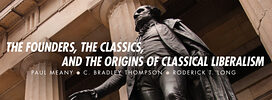Both on the historical issue of the extent of the American founders’ indebtedness to classical antiquity, and on the normative issue of the value of the classical legacy, I think we’re all agreed that it’s a complicated mix. So what I have to offer in this comment is not really a bold salvo of any sort, but just a few observations and quibbles.
C. Bradley Thompson rightly points to Jefferson’s and Adams’s skeptical attitude toward the merits of Plato as a political thinker; but I don’t think we should infer from this that the influence of the ancients upon the founders lay mainly in the ethical rather than in the political sphere. For most of the criticisms that Jefferson and Adams make of Plato’s Republic, Aristotle had made before them – as they surely knew. Jefferson, after all, explicitly lists Aristotle (though not Plato) among the “elementary books of public right” upon which he relied in drafting the Declaration of Independence.[1]
So if we’re interested in ancient influences on the founders’ political ideas, Aristotle is probably a better place to look than Plato, particularly in the sections of the Politics that are more concerned with the problems of second-best and third-best constitutions, such as managing the effects of faction.
Thompson does note that the founders were influenced by Aristotle’s (and, I would add, Thucydides’) ideal of a “mixed and balanced republic”; but here we should really also pay due credit to Polybius, who developed the Aristotelean mixed-constitution idea into a much fuller account of checks and balances, particularly in Book 6 of his Histories. Notably, Polybius shows up on Jefferson’s list of recommended books;[2] and the other founders were of course familiar with him as well.
It’s true, as Paul Meany observes, that both Athens and Sparta had had, or took themselves to have had, “semi-mythical lawgiver figures” in the persons of Solon and Lycurgus (with Solon perhaps being a bit more historically grounded than Lycurgus), and that this tradition stands opposed to the more Hayekian conception to which I pointed in Cicero.[3] However, there’s one qualification to this picture of “an omnipotent legislator over a mostly passive population” – namely, that both Solon and Lycurgus are traditionally described as having removed themselves from their respective cities once their legislation had been completed, rather than seeking to hold a position of political power within the polity thus established.
This puts the Solon and Lycurgus legends a bit closer to Madison’s observation that political institutions must be designed on the assumption that “enlightened statesmen will not always be at the helm”[4] – and thus aligns them with the American constitutional hope for a “machine that would go of itself,” to cite the phrase originated by James Russell Lowell and popularized in recent times by Michael Kammen’s book of the same name.[5] (Rousseau in The Social Contract likewise insists that his ideal legislator, having completed his legislative efforts, should not seek or expect to rule over the polity he has worked to design.) And one of the first ancient thinkers to clearly state the need for a political system to be able to function well in the absence of wise legislators is Plato – not in the Republic, with its elite cadre of philosopher-kings, but in the Statesman. And there is a traceable thread on the virtues of the rule of law, running from Plato’s Statesman through Aristotle’s Politics to Locke’s Two Treatises and Montesquieu’s Spirit of the Laws.
Of course there is a tension – though not necessarily a contradiction – between the idea of a constitutional machine that runs itself in the absence of enlightened statesmen, and the idea of a legislative order’s being flexible and open to ongoing change in the way that Meany calls for. (Again, Plato’s Statesman is devoted to exploring precisely that tension.) I would suggest, however, that a competitive market order is likely to negotiate that tension more successfully than can a monopolistic state system.
Meany adds that unlike Athens and Rome, whose laws “developed and changed over time,” the Spartans “rigidly stuck to their laws.” But not all contemporary observers were convinced that legal continuity in Sparta was as strong as that description would seem to suggest. Xenophon, for example, declares: “Should anyone ask me whether I think that the laws of Lycurgus still remain unchanged at this day, I certainly could not say that”[6] – though he takes the alteration in Spartan laws to be a matter of reproach rather than of praise. Lip service to a founding and immutable law is often quite compatible with enormous real-world changes in its interpretation and application – as witness the United States’ own constitutional history.
Notes
[1] Thomas Jefferson, Letter to Henry Lee, 8 May 1825:
https://founders.archives.gov/documents/Jefferson/98-01-02-5212
[2] Thomas Jefferson, “List of Recommended Books,” ca. 4 October 1809:
https://founders.archives.gov/documents/Jefferson/03-01-02-0453-0002
[3] On this general topic, see Geoffrey Allan Plauché, “On the Myth of the Founder-Legislator in Political Philosophy: Synthesizing Some Ideas of Arendt, Aristotle, Ferguson, Hayek, and Locke That Have Anarchist Implications”: https://gaplauche.com/wp-content/uploads/2013/08/foundermyth.pdf ; and Charles W. Johnson, “Remarks on Geoffrey Plauché’s ‘On the Myth of the Founder-Legislator in Political Philosophy,’ Rad Geek People’s Daily (13 January 2007): http://radgeek.com/gt/2007/01/13/remarks_on/
[4] James Madison, Federalist §10: https://founders.archives.gov/documents/Madison/01-10-02-0178
[5] Michael Kammen, A Machine That Would Go of Itself, 2nd ed. (Routledge, 2006).
[6] Xenophon,Constitution of the Lacedaemonians 14.1; in Xenophon, Scripta Minora, trans. E. C. Marchant, G. W. Bowersock (Harvard U. Press, 1925):

